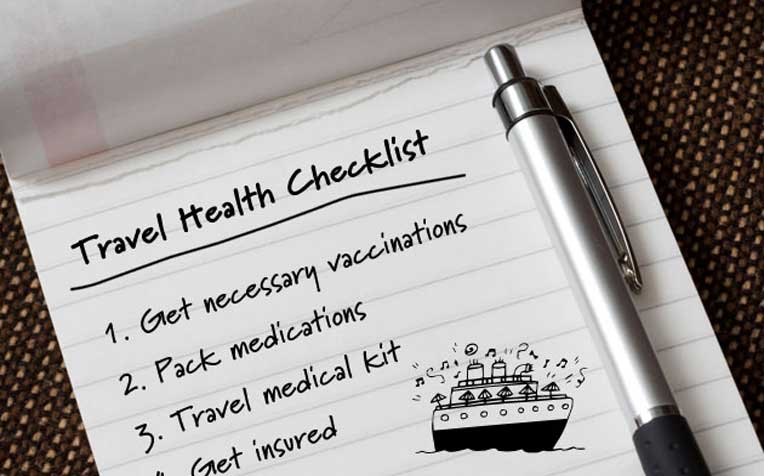
A month before travelling to exotic destinations, do consult your doctor about the necessary vaccinations and medications.
If you are jetting off to an exotic destination, have you considered what you need to do to be prepared, health-wise?
“Travellers should consider the health risks associated with the specific destination they are heading to,” advises Dr Limin Wijaya, Head and Senior Consultant, Department of Infectious Diseases, Singapore General Hospital (SGH), a member of the SingHealth group.
“This is especially true if you are going to less developed locales or exotic places like Africa, South America, India and the Middle East.”
So, get ready by ticking off this travel health checklist before you go:
1. Get the necessary vaccinations
Schedule an appointment with your doctor at least a month before your trip. Dr Wijaya explains, “Some vaccinations require multiple doses spread over a month to be effective.”
Hepatitis A and typhoid fever are the two most common food-borne illnesses which are easily preventable via vaccination. “Rabies is an illness that is highly fatal. As such, it would be important to be vaccinated,” adds Dr Wijaya.
Other vaccines to consider:
| Recommended vaccine | Suitable for country / region that you are travelling to |
|---|---|
| Hepatitis B | Good to have no matter where you're going, especially if you will be in developing countries |
| Japanese encephalitis | A recommended vaccination if you will be spending lots of time in rural areas in Asia |
| Yellow fever | Required for travel to certain places such as sub-Saharan Africa and South America. You will need to carry proof of the vaccination with you. |
| Tetanus | Most of us have received this vaccination against the bacterium Clostridium tetani in school. If it’s been over 10 years since your last tetanus shot, you might need another one. |
2. Pack medications that you take regularly
If you have any pre-existing health conditions, ask your doctor to prescribe extra doses of your regular medications for your trip. Dr Wijaya says, “Make sure you have enough supply to last the entire trip, including any unexpected delays.”
Also ask your doctor if he would be able to prescribe other medications that you might need. For instance, anti-malarial tablets are crucial if you are travelling to malaria-prone areas. You may need acetazolamide (to prevent acute mountain sickness) if you are travelling to high-altitude areas.
Dr Wijaya adds, “Be sure to tell your doctor about any pills and supplements you’re already taking to avoid any risk of interactions.”
3. Put together a travel medical kit
- Anti-diarrhoea pills
- Plasters
- Antiseptic cream
- Sunblock
- DEET-containing repellents
- Pain-killers
- Anti-histamines
- Oral rehydration salts
You don’t need to carry a huge bag of medications. “Pack enough to last for three days”, says Dr Wijaya. “If you are still feeling unwell beyond that, you should seek medical help at your destination.”
However, if you are planning an adventure-based trekking trip in Nepal, where it’s likely that you will be physically far away from a healthcare facility, you will need a more comprehensive travel medical kit, including:
- Sterile gauze swabs
- Adhesive dressings
- Splints and bandages
- Scissors
- Safety pins
3. Get insured
As illness or injury can unexpectedly occur while you are abroad, don’t forget to get adequate travel insurance coverage before you leave the country. Register yourself with the Ministry of Foreign Affairs.
“When we meet with accidents or require medical attention overseas, it can be difficult and expensive to get help,” explains Dr Wijaya.
So even for short trips, it will make sense to get travel insurance that covers your medical expenses while overseas. Make sure that you have the contact number of the medical assistance on hand whilst travelling.
4. Be super safe, not sorry
In foreign countries, a little common sense goes a long way to prevent you from falling ill. Follow these tips with regard to water:
- Drink only bottled water
Even when you are brushing your teeth, use bottled water, not tap water
- During a shower, avoid drinking the water accidentally
As for food, Dr Wijaya recommends you only eat food that is hot, cooked or freshly peeled to lessen your risk of food-borne illnesses.
If you’re travelling to a high-altitude destination, make sure you’re aware of the symptoms of severe acute mountain sickness.
The main symptoms of acute mountain sickness include:
- Headaches (which could be a sign of dehydration)
- Lack of appetite, nausea or vomiting
- Fatigue or weakness
- Dizziness or lightheadedness
- Insomnia
- Shortness of breath at rest
- Persistent rapid pulse
- Peripheral edema (swelling of hands, feet and face)
“When you consult your doctor about your trip, don’t hesitate to ask all the questions you may have. It may save your life!” says Dr Wijaya.
The SGH Travel Clinic is run by specialists from the Department of Infectious Diseases. It is a designated Yellow Fever Centre. The team of doctors and nurses will offer comprehensive travel advice and country-specific recommendations prior to your trip.
Ref: T12


















 Get it on Google Play
Get it on Google Play